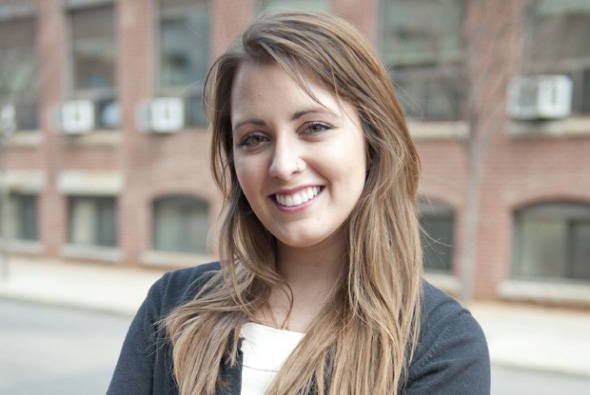Art + science = career

Senior physics major Emily Batt learned an important lesson by conducting research on melancholy 17th-century monks for a directed study as an undeclared freshman.
“It was the first time I realized that one topic could be approached and understood from many different perspectives,” said Batt, who was named the 2012 student commencement speaker by members of the university’s senior leadership team. “Considering a topic from a new point of view or with a different methodology can bring forth new solutions to old problems.”
Her research philosophy has shaped her wide range of experiential-learning opportunities at top-tier firms, labs and universities.
Batt has conducted research on physical oceanography for Oregon State University; examined the link between cancer and biological cell networks for the Dana-Farber Cancer Institute; designed dozens of biomedical devices for Fikst Product Development, a product design and engineering firm in Woburn, Mass.; and created a network-science-based computer simulation of macroeconomic principles for the Massachusetts Institute of Technology Media Lab.
“Co-op showed me what my strengths and weaknesses were and made me a more conscientious worker and a better leader,” Batt said. “I was able to discover jobs that focused on my interests in very different ways.”
Batt, a Merrimack, N.H., native, is eager to address some 20,000 graduating students, their families and friends at the university’s 110th commencement.
The bulk of her speech will focus on the explicit connection between achieving personal success and building reciprocal relationships at home, in the workplace and throughout the world.
Batt, who was named one of Northeastern’s Most Influential Seniors, offered a perceptive piece of advice to her peers, many of whom have already lined up full-time jobs around the globe. “Learn how to be productively engaged in many communities at once,” she said. “Try to be cognizant of the other people you are working with, and understand your motivation may not be the same as theirs.”
Batt was accepted into the master’s program in engineering at the University of Cambridge, England, but opted to take a full-time job with Fikst starting this fall.
She dreams of running a studio in which fine artists and engineers collaborate on experimental projects in science and design. “The work would be grounded in technology and focused on aesthetics and usability,” Batt said. “Exciting collaborations and new discoveries might not happen if people of very different professions don’t work in the same space.”





